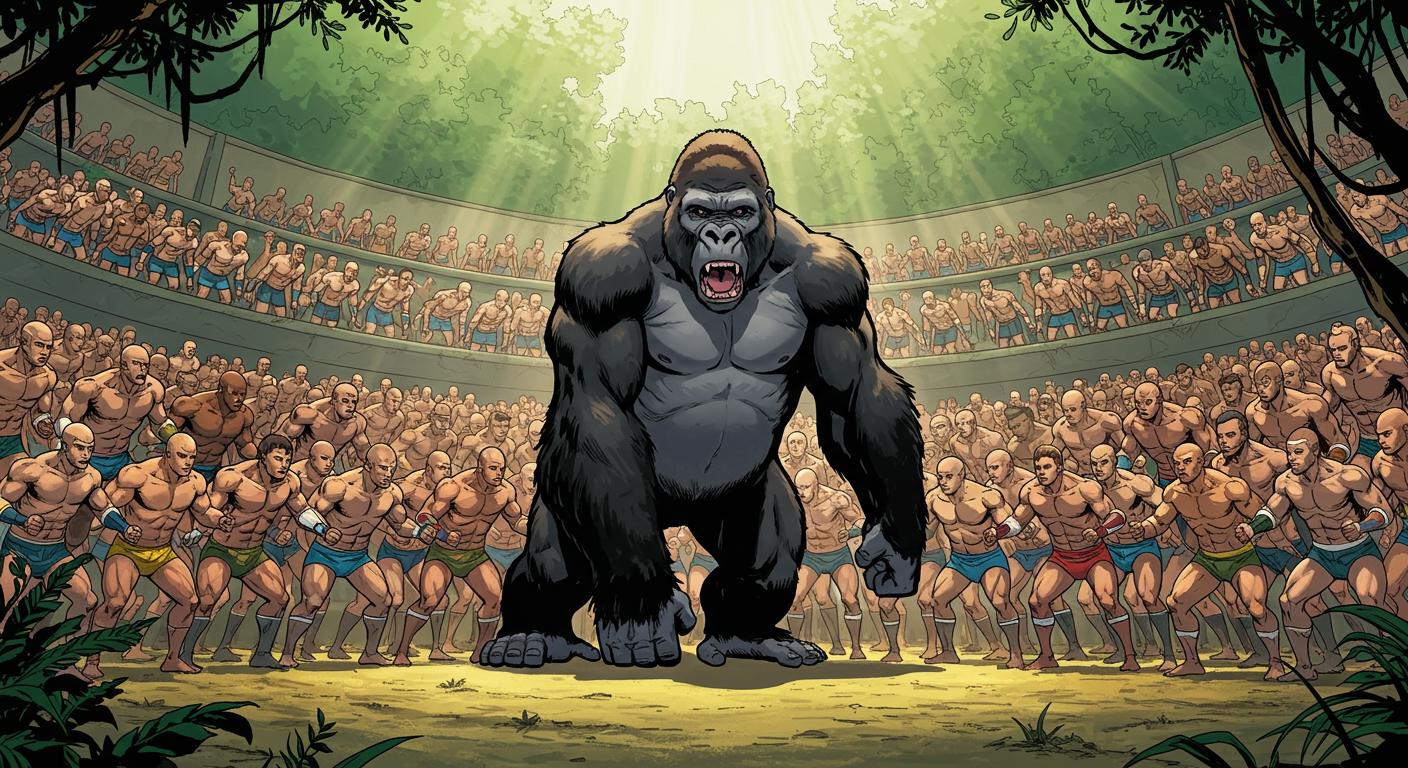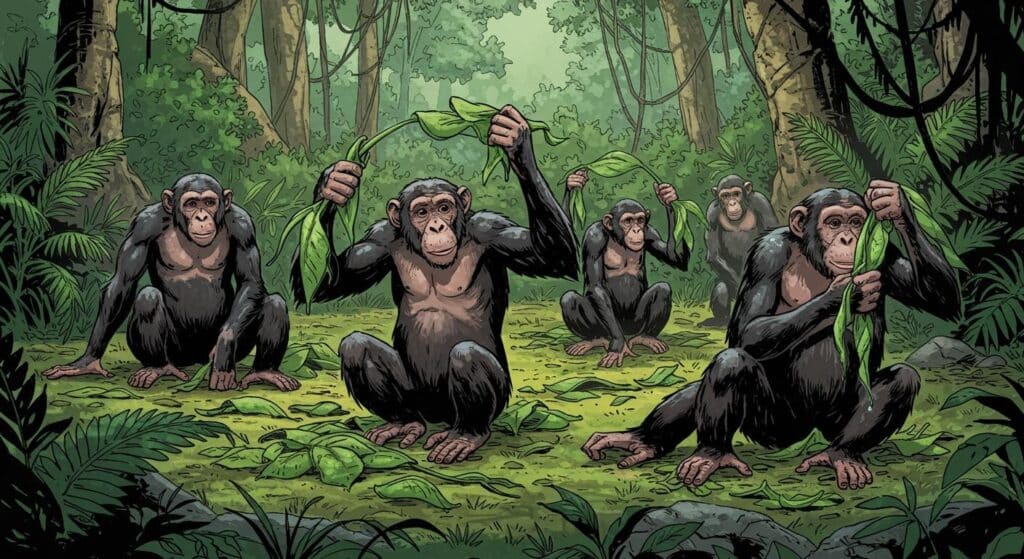Every so often, the internet gifts us a debate so mind-bendingly odd and persistent, it feels less like a question and more like an elaborate performance art piece. Lately, the halls of social media—from Facebook memes to TikTok think-pieces—have echoed with one such enigma: “Could 100 men beat a single gorilla in a fight?” As detailed in NewsNation’s recent report, this theoretical showdown has become the platonic ideal of internet hypotheticals—equal parts “pub debate” and “What if the world was written by Reddit commenters?”
Let’s try to make sense of it—because ignoring it at this point would feel like admitting defeat.
“A Numbers Game” in the Arena of the Absurd
So, here’s the setup as described in the NewsNation Picture your standard gorilla—clocking in at around 400 pounds, built like the original action figure, with a jaw that could casually turn watermelons into mist and muscle definition that would shame any gym regular. Now, opposite him, a human flash mob: 100 average adults. Not Navy SEALs, not Olympic athletes—just folks who can be summoned to a Facebook event on short notice.
NewsNation cites the president and chief scientific officer for the Dian Fossey Gorilla Fund, Tara Stoinski, who in her comments to multiple outlets (including Yahoo! News), points out that while a gorilla absolutely dominates the intimidation category, it’s ultimately a numbers game. Humans, given enough time and some rudimentary teamwork, could tire out the gorilla by “coordinating their behavior,” taking shifts, and gradually wearing him down. Stoinski acknowledged that there would be casualties on the human side—”a number of humans” wouldn’t be so lucky at the start—but sheer numbers, she concludes, win out.
Shannon McFarlin, an anthropology professor at George Washington University and also part of the Dian Fossey Gorilla Fund, offered a similar take according to NewsNation’s summary of her remarks to ABC News. Initially, it’s tempting to back the gorilla, especially considering the raw power a silverback brings to the table. But, McFarlin suggests, over time, as exhaustion sets in and humans take a more tactical approach—rotating out, coordinating attacks—the gorilla would eventually be overwhelmed. The first wave of humans may be “very unlucky,” as McFarlin puts it, but victory goes to those who last longest.
So it turns out, at least on paper, the internet’s faith in the collective power of coordinated people might not be wholly misplaced. It’s an oddly optimistic scenario, though there’s a whiff of tragic ambition to it. Has anyone in this debate actually stood within ten feet of a gorilla?
When Experts Aren’t Thrilled by the Premise
While both experts, as quoted through NewsNation’s compilation, grant reluctant victory to the human horde, neither seems particularly delighted at the thought experiment. Full credit to Stoinski for diplomatically stating that humans wouldn’t come through “unscathed.” No one says exactly how many people would be left standing, but it’s safe to say a chunk of the roster would not be lining up for round two.
NewsNation also highlights how these scientists and conservationists gently nudge us away from the hypothetical carnage and toward a less combative reality. Matt McKim, director of animal care at the Sacramento Zoo, reminded reporters via the NewsNation report (summarizing KSWB coverage) that the real question isn’t about besting gorillas, but about ensuring their continued coexistence with humans. He encourages those fascinated by gorillas—fighting fantasies aside—to learn more about actual conservation efforts at organizations like GorillaDoctor.org.
In a similar redirect, Robert Irwin (famed for being Steve Irwin’s son and for his own conservation work), took to TikTok, and as noted in the NewsNation roundup, posed a much different version of the question: not “how many people does it take to beat a gorilla,” but “how many people does it take to save them?” Given the dwindling numbers of these animals, it’s a pointed shift—less action movie, more public service announcement.
An Endangered Species and the Meme Arena
It’s hard not to notice the strange juxtaposition here: gorillas, featured by NewsNation as an endangered species on the sharp end of habitat loss, poaching, and disease, are being imagined as the main event in a human-versus-beast showdown. There’s an irony in how an internet meme can swing the spotlight from conservation to combat—a seriousness diluted in the speculative spectacle of whether Chad from accounting could “tank” a gorilla while Steve from HR sneaks up behind.
And yet, as NewsNation documents, the real numbers at stake concern extinction rates and conservation budgets. Maybe the meme isn’t as far removed from reality as it seems: every iteration of the debate brings a burst of attention to gorillas, if only for a fleeting moment and not always in the context their advocates might hope for.
What the Debate Actually Reveals
Step back, and what do we find? Experts, as summarized in NewsNation’s reporting, agree that—given enough time, coordination, and a willingness to sustain heavy losses—100 humans would likely prevail against a single gorilla. But the hypothetical serves as a Rorschach test for our strange contemporary blend of fascination, anxiety, and idle speculation. When life is complicated, sometimes the mind craves the simplicity of impossible matchups.
In all this, the dry truth remains: the questions we obsess over often say more about us than the answers ever could. There’s an odd comfort in turning serious subjects into convoluted, nerdy roleplaying scenarios—one part distraction, one part engagement, maybe even one part accidental education.
So does this mean 100 moderately capable individuals really could outlast a gorilla in an all-out brawl? Experts think so, though not without a hefty price—and certainly not with any real-world justification. If we’re capable of such coordination, wouldn’t it be even more impressive if we put that energy toward saving gorillas, rather than lining up for meme glory?
It’s a lingering question: What else could 100 people accomplish, if they weren’t busy inventing new ways to test a gorilla’s patience?







